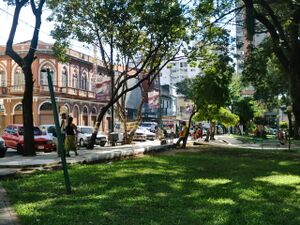
- Resident-managed sanitation board provides drinking water for residents in Paraguay, Aug 20, 2018...[1]
News and comment[edit | edit source]
2009
Desertification is also taking its toll in Paraguay, where the dry seasons have been prolonging during the last years. Today we have several areas in the country that are under environmental emergency due to the lack of rain. Many people blame the changes to the indiscriminate deforestation. Right now there are about 20,000 Has. of forest in the Teixeiras lands that might be cut down if the government purchases the lands as part of the land reform.[2] November 4 - comment by Ricardo
Maps[edit | edit source]
Environmental issues[edit | edit source]
Paraguay also has a growing pollution problem. Many of the country's rivers suffer from toxic dumping. Tanneries are particularly harmful, releasing mercury and chromium into rivers and streams. Runoff from toxic chemicals used by farmers also seeps into Paraguay's waters. In the Chaco, the salination of already arid land makes farming even more difficult. Furthermore, poachers have almost free rein in Paraguay, and continue to foster the illegal trade in armadillo, deer and crocodile skins. W
Social issues[edit | edit source]
The methods of appropriating land in Paraguay are numerous. Economist Luis Rojas says that the most common method is to buy land from small producers: "The peasant is offered a sum of money he has never seen in his life. He imagines it's a fortune, leaves for the city, spends it all in three or four months and makes the misery belts grow, because there is no work." Oxfam estimates that 900,000 people have been evicted from the countryside in the last ten years,[when?] which represents nearly one-seventh of the population. This crowd of landless peasants is swelling the poverty belts around Asunción, the capital. W
Literacy rates have been extremely low among Paraguay's indigenous population, who had a literacy rate of 7.1% compared to the 51% rate of the general population as of the 2002 census.
Only 2.5% of Paraguay's indigenous population had access to clean drinking water and only 9.5% had electricity as of 2002.
About Paraguay[edit | edit source]
Paraguay (; Spanish pronunciation: [paɾaˈɣwaj] ), officially the Republic of Paraguay (Spanish: República del Paraguay; Guarani: Paraguái Tavakuairetã), is a landlocked country in South America. It is bordered by Argentina to the south and southwest, Brazil to the east and northeast, and Bolivia to the northwest. It has a population of around 6.1 million, nearly 2.3 million of whom live in the capital and largest city of Asunción, and its surrounding metro area.
Although one of only two landlocked countries in South America (Bolivia is the other), Paraguay has ports on the Paraguay and Paraná rivers that give exit to the Atlantic Ocean, through the Paraná-Paraguay Waterway. The majority of Paraguay's 6 million people are mestizo, and Guarani culture remains widely influential; more than 90% of the population speak various dialects of the Guarani language alongside Spanish. Paraguay's GDP per capita PPP is the seventh in South America. In a 2017 Positive Experience Index based on global polling data, Paraguay ranked as the "world's happiest place". W
Energy in Paraguay is primarily sourced from hydropower, with pivotal projects like the Itaipu Dam, one of the world's largest hydroelectric facilities. This reliance underscores the need for a robust infrastructure, including efficient transmission networks and distribution systems, to leverage the country's renewable resources fully.